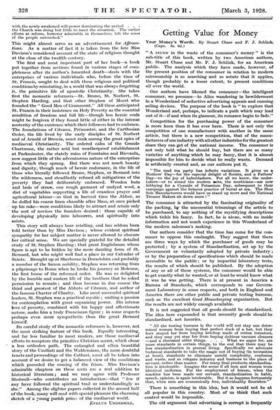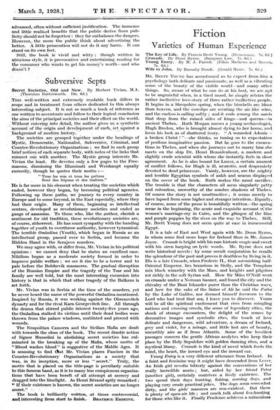Getting Value for Money
Your Money's Worth. By Stuart Chase and F. J. Schlink, (Cape. 8s. 6d.) " A sTunv in the waste of the consumer's money " is the sub-title of this book, written by two American authors,
Mr. Stuart Chase and Mr. F. J. Schlink, for an American public. The analysis which they have made, however, of the present position of the consumer in relation to modern salesmanship is so searching and so astute that it applies, though probably to a lesser extent, to present conditions all over the world.
Our authors have likened the consumer—the intelligent consumer, we presume—to Alice wandering in bewilderment in a Wonderland of seductive advertising appeals and cunning
selling devices. The purpose of the book is " to explore that Wonderland and, perhaps, to indicate a path which niay lead out of it—if and when its glamour, its romance begin to fade."
Competition for the purchasing power of the consumer is more keen than it has ever been. There is not only the competition of one manufacturer with another in the same article, but there is a new competition, that of the manu- facturers of one industry with all other industries for the greatest share they can get of the national income. The consumer is not only told what he should buy, Nit there are so many varieties of anything which he may fancy, that it is almost impossible for him to decide what he really wants. Demand is artificially created and, as our authors put it, " The mad tea party has infinite variations. It gives us a Mothers' Day=for the especial delight of florists, and a Fathers' Day—to the joy of haberdashers. For all we know, the under- takers—or' to sound the modern sate, the morticians—axe now lobbying for a Cyanide of Potassium Day, subsequent to their campaign against the heinous practice of burial at sea. The Shoe Sole Manufacturers would have us stand up more and the National Trouser Makers sit down more ! " -
The consumer is attracted by the fascinating originality of
the packing, by the unessential trimmings of the article to be purchased, to say nothing of the mystifying descriptions
which tickle his fancy. In fact, he is alone, with no inside information and not much experience in this Wonderland of the modern salesman's making.
Our authors consider that the time has come for the con- sumer to oppose this onslaught. They suggest that there are three ways by which the purchaser of goods may be protected ; by a system of Standardization, set up by the
Government or voluntarily adopted by private industry ; or by the preparation of specifications which should be made accessible to the public ; or by impartial laboratory tests,
the results of which should be published. By the adoption of any or all of these systems, the consumer would be able
to get exactly what he wanted, or at least he would know what it was he was getting. There. is at present in America a Bureau of Standards, which corresponds to our Govern-
ment Laboratory in some respects, and both in England and America there are other public and private testing bureaus,
such as the excellent Good Housekeeping organization. But the results are not widely enough available.
It is not suggested that all goods should be standardized. The idea here expounded is that necessity goods should be standardized, not luxuries.
" All the testing bureaus in the world will not stay one deter. mined woman from buying that perfect duck of a hat, but they hare stayed her from buying ketchup made of rotten tomatoes, and they may yet stay her from buying dubious vacuum cleaners --and a thousand other things. . . . What we argue for, are more standards in certain things, to the end that there may be less standardization in general living.." we advocate technical standards to take the magic ou of buying (in necessities at letist), standards to' eliminate untold complexity, confusion and waste, and so relegate industry and business to the place of servant, rather than master. For many final products, standardiza- tion is intolerable. Imagine the scene if all men and women wore identical uniforms. For the employment of leisure, when the machine' has been made 'our servant, standardization in habit, speech, opinion, is again intolerable. But it so happens fortunately that, when men are economically free, individuality. flourishes."
There is something in this idea, but it would not be at all popular in this country. Most of us think that such control would be impossible. -
The old argument that advertising is corrupt is frequently advanced, often without sufficient justification. The immense and little realized benefits that the public derive from pub- licity should not be forgotten they far outbilance the dangers. However„ the more the public think, about advertising the better. A little persecution will not do it any harm. It can stand on its own feet.
Still; the book is vivid and witty ; though written in atrocious style, it is provocative and entertaining reading for the consumer who "Wants to get his money's worthand who doesn't'? -































































 Previous page
Previous page